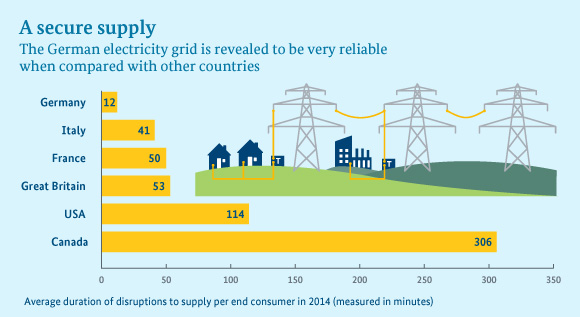Germany's electricity supply is outstandingly secure
Germany is one of the top performers internationally when it comes to its electricity supply. The average time for which an end consumer has to go without power is around just 12 minutes.
 © Federal Ministry for Economic Affairs and Energy; data from CEER 2016; EIA 2015; CEA 2015)
© Federal Ministry for Economic Affairs and Energy; data from CEER 2016; EIA 2015; CEA 2015)
Germany’s electricity supply is particularly reliable, as a comparison with its European neighbours clearly shows. In 2014, the average time for which an end consumer in Germany had to go without power was just 12 minutes and 17 seconds. This was the lowest figure in the whole of Europe. In the same year, the electricity supply in Italy was disrupted for an average of 14 minutes per end consumer. In France, the figure was 50 minutes. Germany’s electricity supply also performs well when compared with countries outside of Europe. In the USA, the end consumer had to go for an average of 114 minutes without power – that is almost two hours. In Canada, the figure rises to just over five hours (306 minutes).
Energy transition not having any negative impact on supply quality
In 2015, the average time for which an end consumer in Germany was without power marginally rose, climbing to 12 minutes and 42 seconds. According to the President of the Bundesnetzagentur (Federal Network Agency) Mr Jochen Homann, the main cause for this development was extreme weather conditions, such as storms and heat waves. “We continue to see that the energy transition and the rising volume of distributed energy-generation capacities are not having any negative impact on supply quality.”
Once a year, operators of energy-supply networks have to present a report to the Bundesnetzagentur detailing each and every disruption to the power supply that lasts longer than 3 minutes. The Council of European Energy Regulators (CEER), the independent association of European regulatory authorities, provides a European comparison of these disruptions as part of its Annual Report on gas and electricity security of supply. The most recent figures available are for 2014.
Plans for capacity reserve for unforeseen events
In order to ensure that the electricity supply in Germany remains reliable even as it integrates a growing share of energy from renewables, it is crucial for it to have a flexible electricity system providing smart networking between consumption and generation, and that it also expands the grid swiftly. The Electricity Market Act, which was adopted last year, puts the rules in place for competition between flexible supply, flexible demand, and storage. Establishing a capacity reserve is intended to provide an additional safety net for whenever unforeseen events occur.

